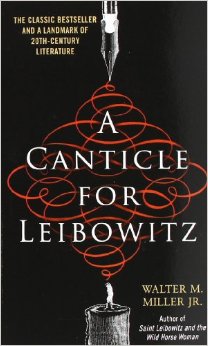Title: A Canticle for Leibowitz
Author: Walter M. Miller, Jr.
Genre: Dystopian/Sci-Fi
Quotation: “Back then, in Saint Leibowitz’ time, maybe they didn’t know what would happen. Or perhaps they did, but could not quite believe it until they tried it…”
Would Recommend to: Fans of 1984 or Brave New World
Miller’s tragic and poignant Hugo Award winner still rings true
A canticle, from the Latin canticum, is commonly translated as a song or hymn of praise. A Canticle for Leibowitz is a stark look into the dystopian future, where humanity may not be praiseworthy at all. Divided into three main sections, the novel is centered on the Leibowitz Abbey, a congregation of devoted monks in the former US Midwest. The monks have a singular purpose — to preserve the breadth of humanity’s knowledge that was almost completely destroyed in an apocalyptic purge.
Though never noted in extreme detail, the reader can glean the basics of the apocalypse from the novel. Mutually assured destruction proved true, and a nuclear holocaust nearly enveloped the Earth; in a backlash, the crippled survivors of the fallout sought to destroy those whom they held responsible for the near destruction of their world. The only people left to target were the educated: scientists, thinkers, and scholars. The novel strikes a chord with fans of dystopian classics such as 1984 or Brave New World because many motifs are shared among the three. The murky past leading to a horrifying future is central to another great story — 2014’s Man Booker short-lister J, which was previously reviewed by Kimberly.
What follows the fallout can only be seen through Walter Miller’s brilliant writing. Miller wrote at a time when an apocalypse seemed imminent, and the political divide between the USSR and the US seemed to grow each day. He may have been afraid of nuclear arsenals, but the more striking theme in Leibowitz is the fear of loss: loss of knowledge, loss of reason, and loss of a sense of humanity. In a future where learning is suppressed and prewar relics, such as a scrap of note paper or a grocery list, must be guarded with nothing short of one’s own life, a book is a gift.
A Canticle for Leibowitz was Miller’s gift to humanity; both warning of what is possible, but also hoping against hope for a better future. Tragically, Miller could not see a better life for himself; he struggled with depression and took his own life in 1996. This fact makes his magnus opus only the more poignant. The future in Leibowitz seems so possible and so horrifying. Classics lovers will be attracted to this book due to the similarities to 1984 and Brave New World; everyone, not just sci-fi fans, will stay for the superb story telling and world-building. A Canticle for Leibowitz envelops you and doesn’t let go, moving the reader with fear, love and hope. It is certainly worth the read.
-RYAN
“Where one burns books, in the end, he will also burn men.” Heinrich Heine, 1820
About the Author Ryan is a student of business, politics, and German. Having recently hiked in the Swiss Alps, Ryan has a new appreciation for the outdoors (and for chocolate). Though summer will soon be over, Ryan knows it’s never the wrong season to read in a nice sunny spot by the window. Up next on his reading list are Brian Greene’s The Fabric of the Cosmos, Rick Atkinson’s The Guns at Last Light: The War in Western Europe, and Tom Clancy’s The Hunt for Red October.



